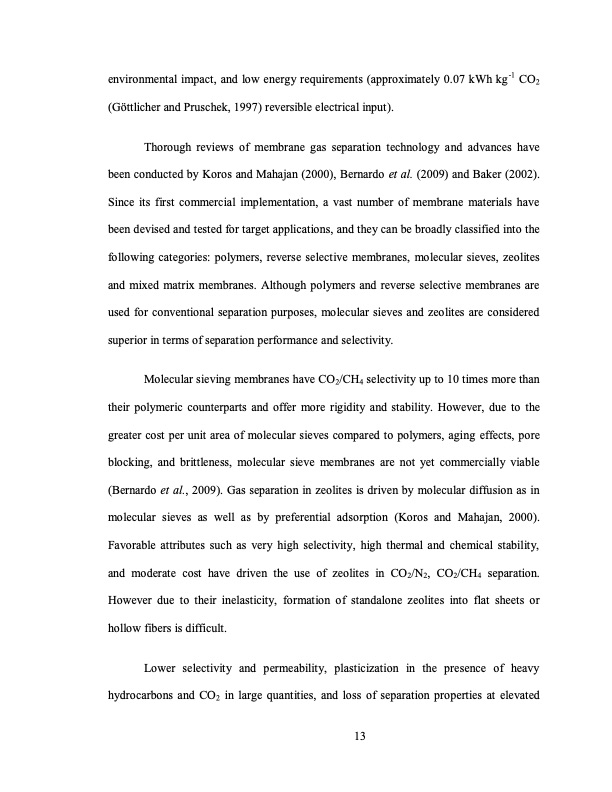
PDF Publication Title:
Text from PDF Page: 040
environmental impact, and low energy requirements (approximately 0.07 kWh kg-1 CO2 (Göttlicher and Pruschek, 1997) reversible electrical input). Thorough reviews of membrane gas separation technology and advances have been conducted by Koros and Mahajan (2000), Bernardo et al. (2009) and Baker (2002). Since its first commercial implementation, a vast number of membrane materials have been devised and tested for target applications, and they can be broadly classified into the following categories: polymers, reverse selective membranes, molecular sieves, zeolites and mixed matrix membranes. Although polymers and reverse selective membranes are used for conventional separation purposes, molecular sieves and zeolites are considered superior in terms of separation performance and selectivity. Molecular sieving membranes have CO2/CH4 selectivity up to 10 times more than their polymeric counterparts and offer more rigidity and stability. However, due to the greater cost per unit area of molecular sieves compared to polymers, aging effects, pore blocking, and brittleness, molecular sieve membranes are not yet commercially viable (Bernardo et al., 2009). Gas separation in zeolites is driven by molecular diffusion as in molecular sieves as well as by preferential adsorption (Koros and Mahajan, 2000). Favorable attributes such as very high selectivity, high thermal and chemical stability, and moderate cost have driven the use of zeolites in CO2/N2, CO2/CH4 separation. However due to their inelasticity, formation of standalone zeolites into flat sheets or hollow fibers is difficult. Lower selectivity and permeability, plasticization in the presence of heavy hydrocarbons and CO2 in large quantities, and loss of separation properties at elevated 13PDF Image | TEMPERATURE SWING ADSORPTION PROCESSES FOR GAS SEPARATION

PDF Search Title:
TEMPERATURE SWING ADSORPTION PROCESSES FOR GAS SEPARATIONOriginal File Name Searched:
PAHINKAR-DISSERTATION-2016.pdfDIY PDF Search: Google It | Yahoo | Bing
CO2 Organic Rankine Cycle Experimenter Platform The supercritical CO2 phase change system is both a heat pump and organic rankine cycle which can be used for those purposes and as a supercritical extractor for advanced subcritical and supercritical extraction technology. Uses include producing nanoparticles, precious metal CO2 extraction, lithium battery recycling, and other applications... More Info
Heat Pumps CO2 ORC Heat Pump System Platform More Info
| CONTACT TEL: 608-238-6001 Email: greg@infinityturbine.com | RSS | AMP |